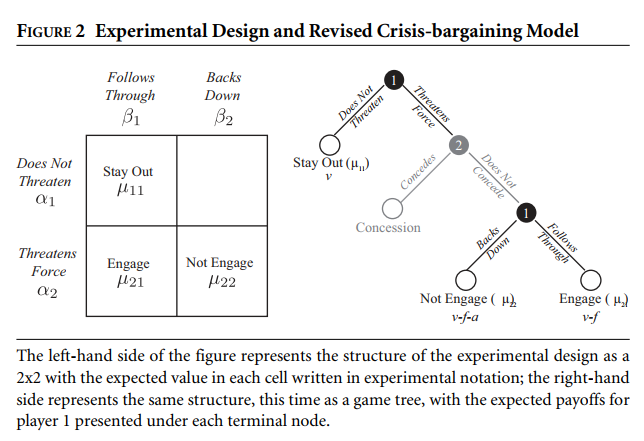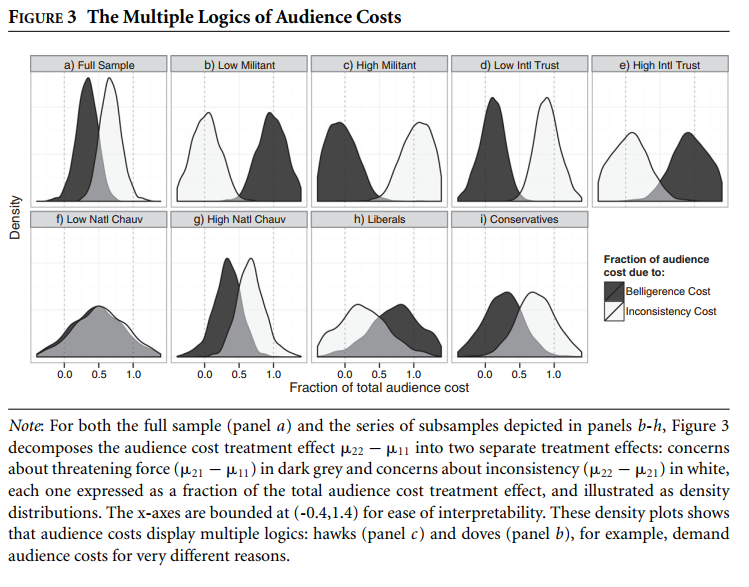Chapter 5 Audience costs (Week 7)
5.1 Discussion questions
Kertzer, J. D. and Brutger, R. (2016). What is the audience cost theory? What have you learned from this paper? Do you agree with their argument? Why?
Trachtenberg (2012). What is the audience cost theory? What have you learned from this paper? Do you agree with his argument? Why?
Aside from audience cost, what other institutional explanations can you think of to explain democratic peace? (*)
“The President Blinked”: Why Obama Changed Course on Syria | FRONTLINE
5.2 Kertzer, J. D. and Brutger, R. (2016)
The main theoretical argument made in the paper can be illustrated by the their figure 2, where they point out existing experimental studies on audience costs apply a treatment with “double-barreled” effect.

And the main empirical results are showcased by figure 3.

5.3 Trachtenberg (2012)
Trachtenberg chooses to examine crises “involving great powers, at least one of which was a democracy, and that were settled without war” (p.6). He argues that “for the audience costs argument to hold, the adversary power has to understand that the democratic leaders would find it hard to give way for fear of incurring audience costs” (p.7).
the “War-in-Sight” crisis of 1875
the Eastern Crisis of 1877–78
- “The whole question of whether Disraeli would be unable to pull back for domestic political reasons was of no great importance for the simple reason that he clearly was not interested in pulling back if the terms were not satisfactory … there was no precise commitment that Disraeli could be blamed for not honoring.” (p.12)
- “The Russians had a different way to avoid paying audience costs … those responsible for the failed policy … were able to limit the audience costs they had to pay.” (p.13)
the Fashoda crisis 1898
- " English opinion, he said, was “extremely overexcited”; when the facts were made public, he hoped, people would be able to approach the issue in a more sober way. Salisbury thus probably did not intend to inflame public opinion. His goal, it seems, was not to curtail his own freedom of action, but rather to safeguard the freedom of action he normally had. Whatever his intentions, the release of the documents led to a “flood of political oratory” in Britain, and the “vehemence of the speakers” meant that even minor concessions could not now be made." (p.15)
- " “Crises,” he wrote, “would occur only when the disadvantaged side irrationally forgets its inferiority before challenging or choosing to resist a challenge”—and that was precisely what happened in 1898."(p.17)
the two Moroccan crises 1905–1906 and 1911
- “It is quite clear, first of all, that Kiderlen sought, in at least a limited way, to stir up opinion at home in order to “strengthen Germany’s bargaining position” in the crisis." (p.20)
- “Lloyd George’s Mansion House speech … had a major bearing on how the crisis was resolved. The speech, however, was no mere bargaining ploy. British leaders were not trying to tie their own hands by creating a situation where retreat was impossible for domestic political reasons. The goal was simply to make it clear that they were willing to go to war if Germany asked for too much.” (p.20)
the Rhineland crisis of 1936
the Czech crisis of 1938
the Turkish and Iranian crises of 1946
the Berlin Blockade of 1948
- " The US government was not interested in taking advantage of the audience costs mechanism to make its threats credible, since the basic tactic of threat-making was not particularly appealing at this point." (p.26)
the Berlin and Cuban crises of 1958–62
- “To be sure, the more sophisticated Soviet officials understood how domestic political factors influenced what the US president could do … In the Cuban case, however, the relevant body of information had been available all along. The problem was that it had been ignored.”
5.4 Additional resources
Putin’s key supporters are now playing a desperate face-saving game in Ukraine
China’s Taiwan Invasion Plans May Get Faster and Deadlier
Scott Gehlbach’s tweet on How popular is Vladimir Putin, see also their 2015 paper Is Putin’s popularity real?